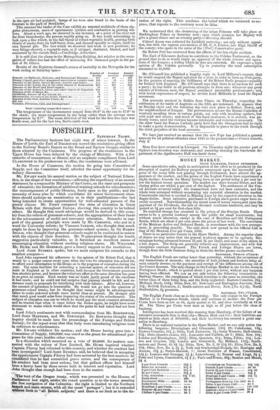POSTSCRIPT.
SATURDAY NIGHT.
The Parliamentary business last night was of minor interest. In the House of Lords, the Earl of DeLnousto moved the resolutions giving effect to the Railway Board's Report on the Broad and Narrow Gauges, similar to those adopted by the Commons. The progress of the resolutions in the Upper House has been delayed by the change of Ministry. With a few remarks of concurrence or dissent, and an emphatic compliment from Lord CLARENDON to his predecessor in office, the resolutions were affirmed.
In the House of Commons, the motion for going into Committee of Supply, and the Committee itself, afforded the usual opportunity for de- sultory discussion.
Mr. EWART made his annual motion on the subject of National Educa- tion, in the shape of four resolutions,—affirming the expediency of an annual statement by a responsible Minister of the Crown, on the state and prospects of education; the formation of additional training-schools for schoolmasters; the encouragement of public libraries, freely open to the public; and the necessity of some plan by which candidates for minor Government situa- tions should undergo an examination as to their qualifications—the last being intended to create opportunities for well-educated persons of the poorer classes. Mr. Ewart compared the state of education in Great Britain with that throughout Europe; showing this country to be behind others. He thought that much advantage would be derived in this coun- try from the reform of grammar-schools, and the appropriation of their funds to the advancement of useful and necessary education. Remarks in sup- port of the general principle were made by Mr. CHRISTIE, who put in a word for University reform; by Viscount SANDON, who thought that much might be done by improving the grammar-school system; by Sir HARRY Nous, who thought that grammar-schools ought to be conducted in unison with the objects of their founders. Mr. WARBURTON thought the fourth suggestion particularly valuable, as it furnished an excellent means of encouraging education without exciting religious alarm. Mr. WILLIAMS, Mr. Hume, and Mr. HORSILAN, gave a hearty support to the resolutions.
Lord JOHN RUSSELL spoke; but we must compress his remarks to the smallest compass— Lord John expressed his adherence to the opinion of Sir Robert Peel, that it would be a proper course every year, when the vote for education was asked for, to afford some information to the House as to the progress of education during the year. The same facilities for extending a national system of education did not exist in England as in other countries, both because the Government possesses less absolute power, and because the voluntary effort in the same direction has gone to so great an extent. Each society was no doubt justly proud of the exertions it had made; and he could not feel surprise that jealousy should be felt and re- sistance made to proposals for interfering with their labours. After all, however, the amount of ignorance is lamentable. He would not go into the question of grammar-school trusts; but he thought that means might be advantageously taken to make endowed schools more useful than at present. He thought also that much good would arise from improving the status of the schoolmaster. The subject of education was one to which he would pay the most constant attention; and-he trusted that when it came before the House again, he might have some statement to make which would show that the pains he had taken had not been in vain.
Lord John's sentiments met with commendation from Mr. BORTHWICH, Lord Jontr MANNERS, and Mr. ESTCOURT. Dr. ROWRING thought that inquiry should be made into the proceedings of the Foreign and British Society; for the report went that that body were introducing religious tests in reference to schoolmasters.
Mr. EWART withdrew his motion; and the House having gone into a Committee of Supply, 100,000/. was voted as the grant for educational pur- poses for this year; besides other votes.
In a discussion which occurred on a vote of 30,0001. for matters con- nected with the colony of New Zealand, Mr. Thaw inquired whether Captain Fitzroy had returned to this country, and whether his conduct had been investigated? Lord JOHN RUSSELL said, he believed that in accepting the appointment Captain Fitzroy had been actuated by the best motives: hi' considered that he had committed grave errors, and the consequence of -his conduct had been most serious, but that gallant officer had himself been a heavy loser by those errors both in interest and reputation. Lord John thought that enough had been done in the matter.
The text of the Oregon treaty, which was presented to the Houses of Parliament last night, settles the vexed question as to the terms securing the free navigation of the Columbia: the right is limited to the Northern branch and main stream, with all the usual "portages"; but it is extended without limit to "all British subjects," and there is no limit as to the du-
ration of the right. This confirms the belief which we ventured to ex- press, that reports to the contrary must be false.


























 Previous page
Previous page